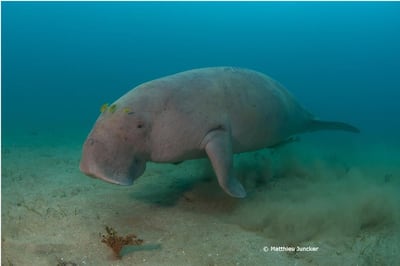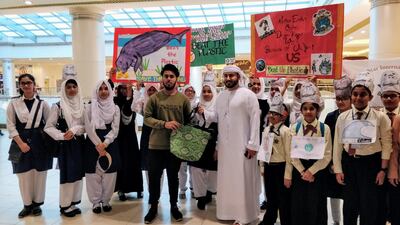It has been described as one of the world’s ugliest mammals.
But Abu Dhabi school pupils have taken the dugong, also known as the sea cow, to their hearts in an effort to help protect the species.
Students from Shaikh Khalifa Bin Zayed Bangladesh Islamia School and Shining Star International School have been campaigning to spread awareness of its plight.
The mammal is largely under threat due to a combination of excessive hunting, habitat loss and water pollution.
“The dugongs are found dwelling in the UAE coastal waters but their numbers have been dwindling,” said Mir Anisul Hasan, principal at the Bangladesh Islamia School.
“This campaign has been designed to spread awareness among the public not to pollute the seas so that these gentle creatures can survive.”
The UAE has led conservation efforts to help protect the dugong, the world’s only herbivorous marine mammal.
The species can grow to three metres long, weigh up to 500kg and eat some 40kg of seagrass a day.
Historically, the mammals were hunted for their meat, oil, skin, bones and teeth. Today, however, they are more threatened by a loss of habitat due to industrial development and pollution.
Despite having protected status, six dugongs were found dead on the Abu Dhabi coast in November last year, with experts blaming illegal fishing practices.
The animals - which need to come to the surface every three to 12 minutes to breathe - were thought to have drowned in abandoned drift nets.
Officially classed as vulnerable, dugongs were chosen by the Abu Dhabi schools as the focus of their campaign after the city’s Environment Agency highlighted their plight and the United Nations made plastic pollution a theme of last year’s World Environment Day.
Around two dozen pupils from the schools held rally in Khalidiyah Mall, wearing dugong masks and giving out cloth bags in an attempt to reduce plastic use.
Abu Dhabi is home to the world’s second largest population of dugongs, with around 3,000 living in the Marawah Marine Biosphere Reserve alone.
Some 7,000 are thought to live in the Arabian Gulf and Red Sea. Globally, they are found in seas around 40 countries in the Indian Ocean and western Pacific Ocean.

The Mohamed bin Zayed Species Conservation Fund is a major partner in the Dugong and Seagrass Conservation Project, an international initiative aimed at preserving the species and its habitat.
“Through these campaigns we aim to create a shared vision among all school students about the need to take action, however small, in order to preserve our environment," said Anita Saul, the eco-club coordinator at Shaikh Khalifa Bin Zayed Bangladesh Islamia School.
“Students learn through these experiences that each one of them has the power to make a positive change to sustain our planet.”

